Thesis
As the volume of digital content explodes the need for audio versions of that content is reaching a dramatic inflection point. Traditional voiceover production has historically been a bottleneck for broader utilization, characterized by high costs, time-consuming processes, and limited scalability. As businesses and creators increasingly demand dynamic, personalized audio content, the need for innovative solutions has never been more urgent.
The emergence of AI voice generation represents a technological watershed moment, mirroring the transformative impacts previously seen in video streaming and social media. The speech recognition market is projected to reach $56.1 billion by 2030, in large part driven by the integration of ML and AI to create algorithms that enable emotionally nuanced, contextually adaptive voice generation. This growth signals a shift in how we conceptualize and produce audio content. Unlike earlier text-to-speech technologies (TTS) that produced robotic, monotonous outputs, modern AI voice generation leverages advanced neural network-based synthesis to create significantly more human-like voices.
ElevenLabs offers an AI-powered voice generation platform that addresses the critical industry pain points of quality, trust, and reliability. By employing voice cloning algorithms, ElevenLabs enables creators and businesses to produce personalized audio content at efficient speed and scale. Its technology reduces time-to-market and operational costs but also opens doors to possibilities across media, entertainment, education, and customer service.
The platform's core innovation combines proprietary methods for context awareness and high compression with the ability to generate realistic, emotionally rich voices. Personalization and emotional intelligence are becoming key differentiators in digital communication tools, underscoring the growing demand) for adaptive voice technologies. By focusing its approach beyond technological implementation and on creating genuinely human-like audio experiences that can be integrated across diverse industry applications, ElevenLabs is positioned to be a meaningful player in the AI voice generation market.
Founding Story

Source: Endeavor
ElevenLabs was founded in 2022 by co-founders, Piotr Dąbkowski and Mati Staniszewski. The pair first met as teenagers at Copernicus High School in Warsaw, Poland. Their friendship was built on a shared passion for technology and innovation.
After high school, their paths took different academic routes. Staniszewski studied mathematics at Imperial College London and gained experience working at Palantir Technologies. Dąbkowski pursued degrees from Oxford and Cambridge, focusing on AI and machine learning. His AI-based image detection thesis was even published at NeurIPS, a leading machine learning conference.
Before ElevenLabs, they collaborated on several projects, including an accent-detection app and a recommendation engine. However, they were consistently frustrated by the robotic quality of existing text-to-speech (TTS) technologies like Siri and Alexa. Their shared experience with Poland's monotone film dubbing, where a single actor voiced every character, fueled their desire to create more authentic voice technology. They identified a key problem: existing TTS technologies sounded obviously artificial.
Their approach was unique. Instead of using existing models, they conducted in-house research to understand what makes human voices sound human. They developed their own text-to-speech and voice models that could capture the nuanced "humanness" of speech.
In April 2022, they co-founded ElevenLabs as a research-first company whose mission was to make quality content available across all languages. Their initial prototypes stood out by replicating human elements like natural pauses, laughter, and conversational fillers. This approach proved the feasibility of creating more lifelike artificial voices. The market validated their vision quickly. By January 2023, just five months after launching their beta platform, ElevenLabs had attracted over one million users. Staniszewski explained the approach he and his co-founder took to building ElevenLabs this way:
“Don’t start solving something with AI just because AI is everywhere right now. Instead, focus on something that you will actually enjoy solving and want to work on.”
Product
Projects
ElevenLabs' Projects platform is designed for creators seeking high-quality, long-form text-to-audio generation. Tailored to transform books, scripts, and articles into polished audio content, it streamlines workflows for audiobook publishers, podcasters, educators, and other professionals. With features such as speaker assignment, contextual cohesion, and customizable pacing, users can generate, edit, and refine entire audio projects efficiently. The platform supports various file formats, including .epub, .pdf, .txt, and direct URLs, enabling seamless integration with existing content. Advanced editing tools allow for selective regeneration of audio fragments and precise control over pause lengths, ensuring a polished final product.
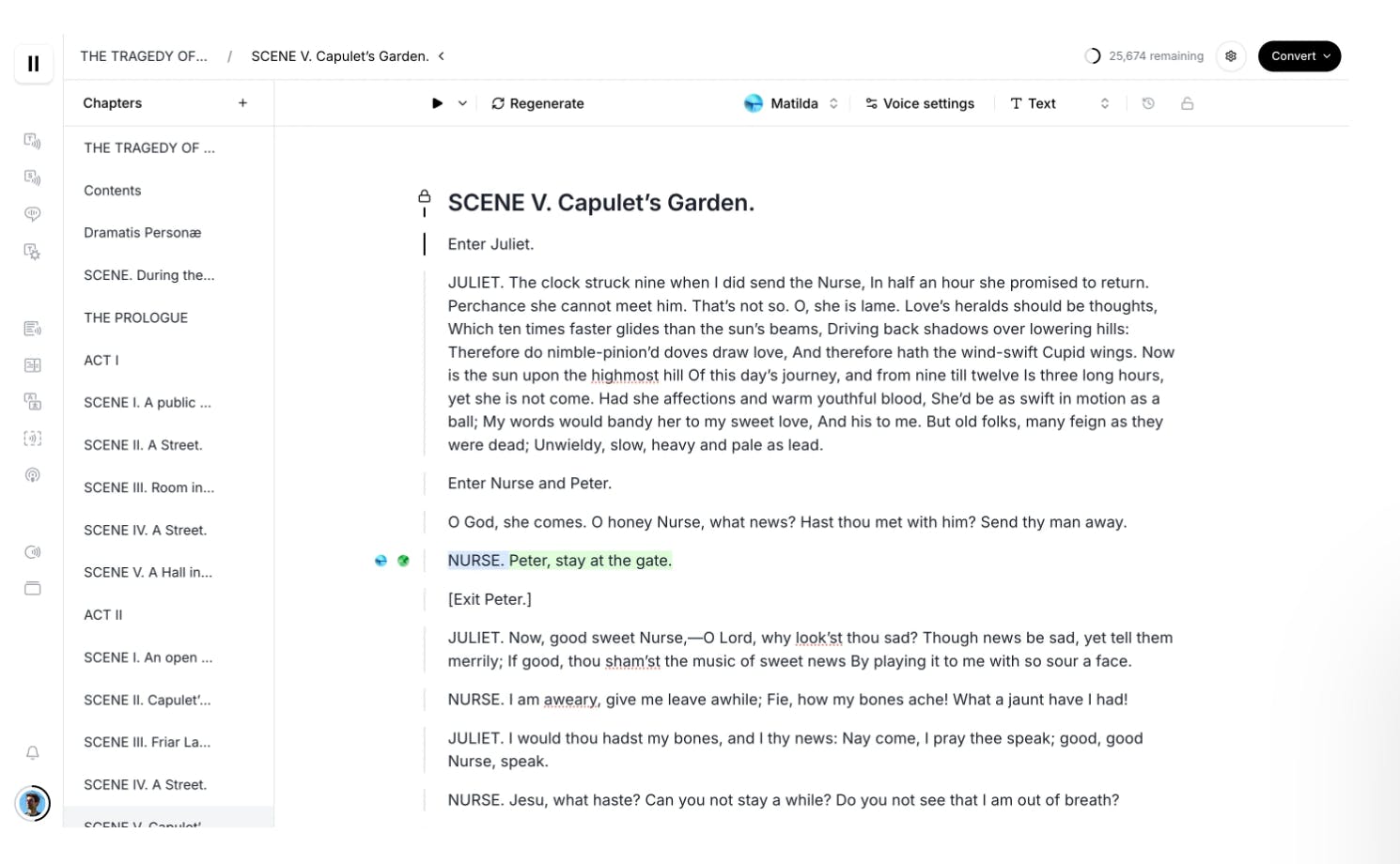
Source: ElevenLabs
A standout feature of Projects is its integration with the ElevenLabs ecosystem. This includes professional voice cloning for personalized narration, a community-driven voice library, and multilingual support for global accessibility. Once a project is complete, users can embed their narration onto websites via the Audio Native feature. The platform's primary value lies in simplifying audio creation, minimizing manual effort, and delivering professional-quality results. By addressing challenges such as maintaining narrative consistency and reducing editing inefficiencies, Projects enables both seasoned and casual creators to produce compelling content more easily.
Use cases for Projects illustrate its versatility. For instance, HarperCollins has leveraged the platform for audiobook production, while educators have created narrated lesson plans using multilingual capabilities. Media companies employ Projects for podcast generation with character-specific voices, and enterprises like Bertelsmann use it to scale multilingual storytelling and reach global audiences.

Source: ElevenLabs
Dubbing Studio
ElevenLabs' Dubbing Studio empowers creators to localize video content seamlessly, enabling translation and dubbing into multiple languages while preserving natural voice quality and precise synchronization with visuals. Built on an advanced AI engine capable of replicating human voice patterns, the platform supports diverse voice types, accents, and emotional tones. Users can input text and generate voiceovers tailored to their desired tone and style, offering a level of customization beyond traditional methods.
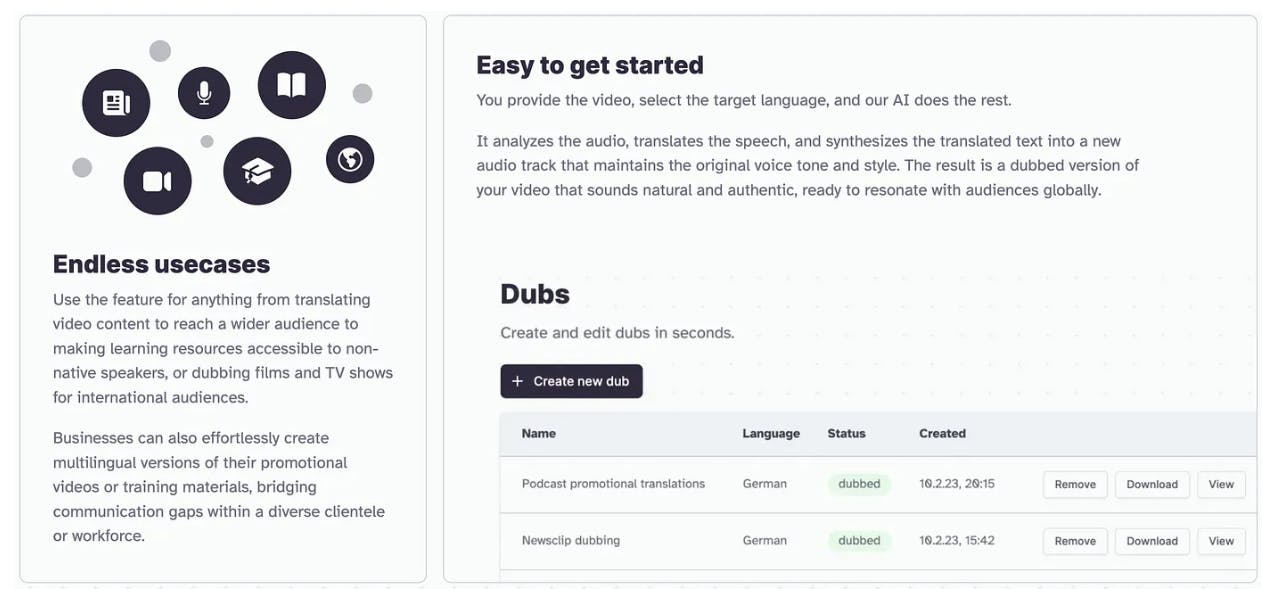
Source: Medium
The platform includes features such as full transcript generation, editable translations for contextual accuracy, and advanced voice cloning. Speaker isolation allows individual voice replication, while adjustable settings like stability and delivery style ensure alignment with the original performance. Precise audio-video synchronization is achieved through customizable timecodes and selective regeneration of segments, making it easier to refine timing and delivery. Additionally, the flexible editing interface includes tools like speaker cards and customizable audio layers for detailed control over dialogue and soundtracks.

Source: ElevenLabs
Dubbing Studio supports popular file formats, including MP4, MOV, and WAV, and offers CSV upload for manual dubbing. Its value proposition centers on efficiency, flexibility, and quality. By streamlining complex workflows and maintaining the integrity of original voices, it enables creators to produce more engaging, localized content without compromising on synchronization or clarity.
Media companies have used it to localize films into multiple languages, ensuring character consistency across regions. Online educators translate video lectures while retaining the original instructor's tone, and corporations adapt training materials for diverse global teams. Marketing campaigns also benefit from refined, culturally nuanced translations to resonate with varied audiences. One example demonstrates the platform’s ability to refine awkward translations into fluent, contextually appropriate dialogue, showcasing its precision in creating high-quality localized content.
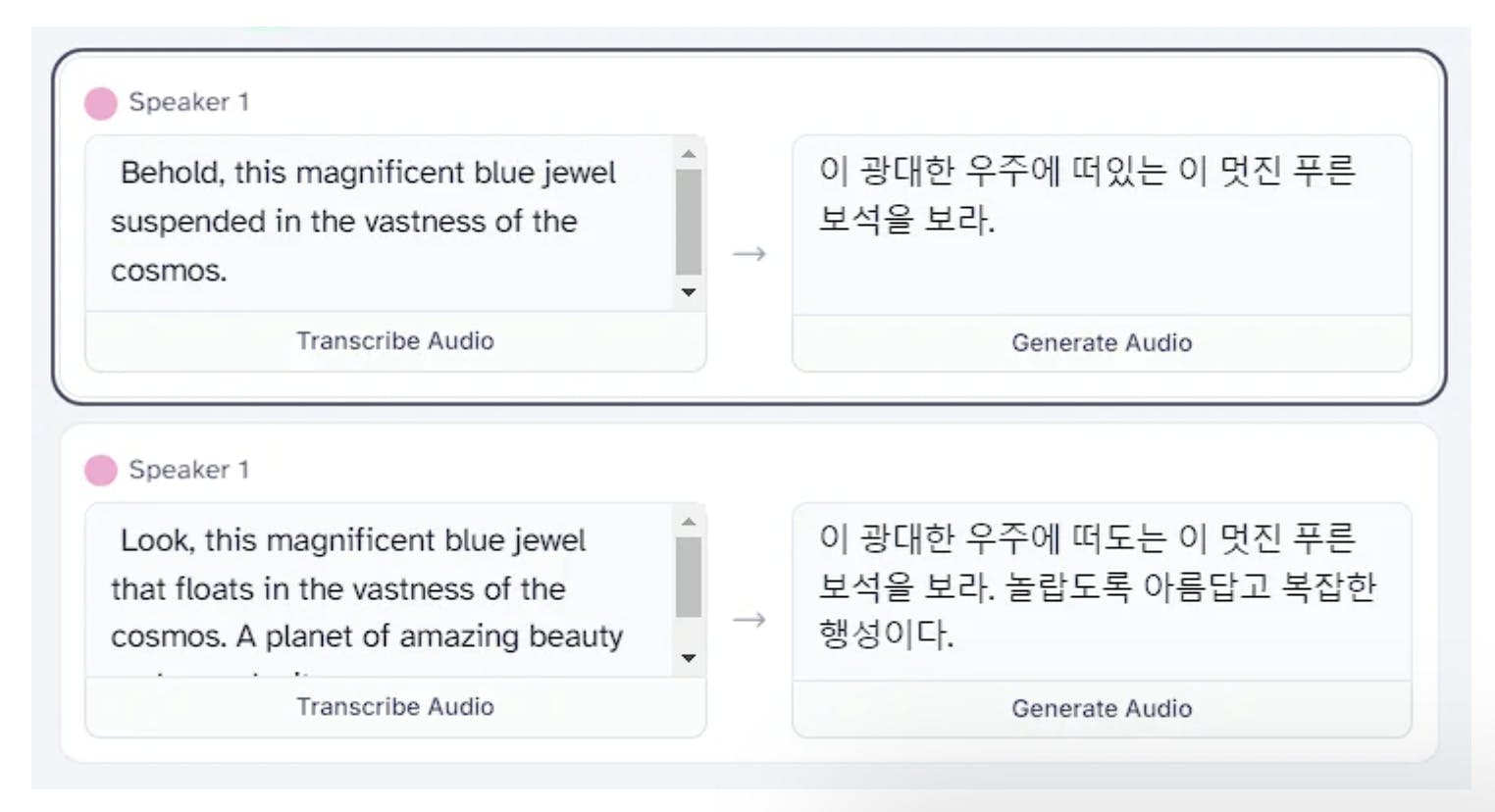
Source: ElevenLabs
Audio Native
Audio Native is ElevenLabs’ fully TTS solution, enabling creators, publishers, and businesses to embed lifelike narration into websites, apps, and other digital platforms. This tool enhances accessibility and user engagement by converting text-based content into high-quality audio. Audio Native is tailored to accommodate diverse audiences, making it an effective solution for broadening content consumption.

Source: ElevenLabs
The product offers several features to cater to varied needs. Its automated narration capabilities transform articles, blog posts, and other written content into natural-sounding speech, with voices that can be customized to align with a brand’s tone and style. The embeddable audio player ensures an intuitive user experience, featuring playback controls like play/pause, rewind, and adjustable speed. Additionally, Audio Native supports a library of pre-configured voices and allows for custom voice creation to reflect brand identity. Its multilingual capabilities include localization, enabling narration that adapts to regional speech patterns and cultural nuances. The tool also integrates with content management systems (CMS) like WordPress through API-based solutions, ensuring scalability for publishers.
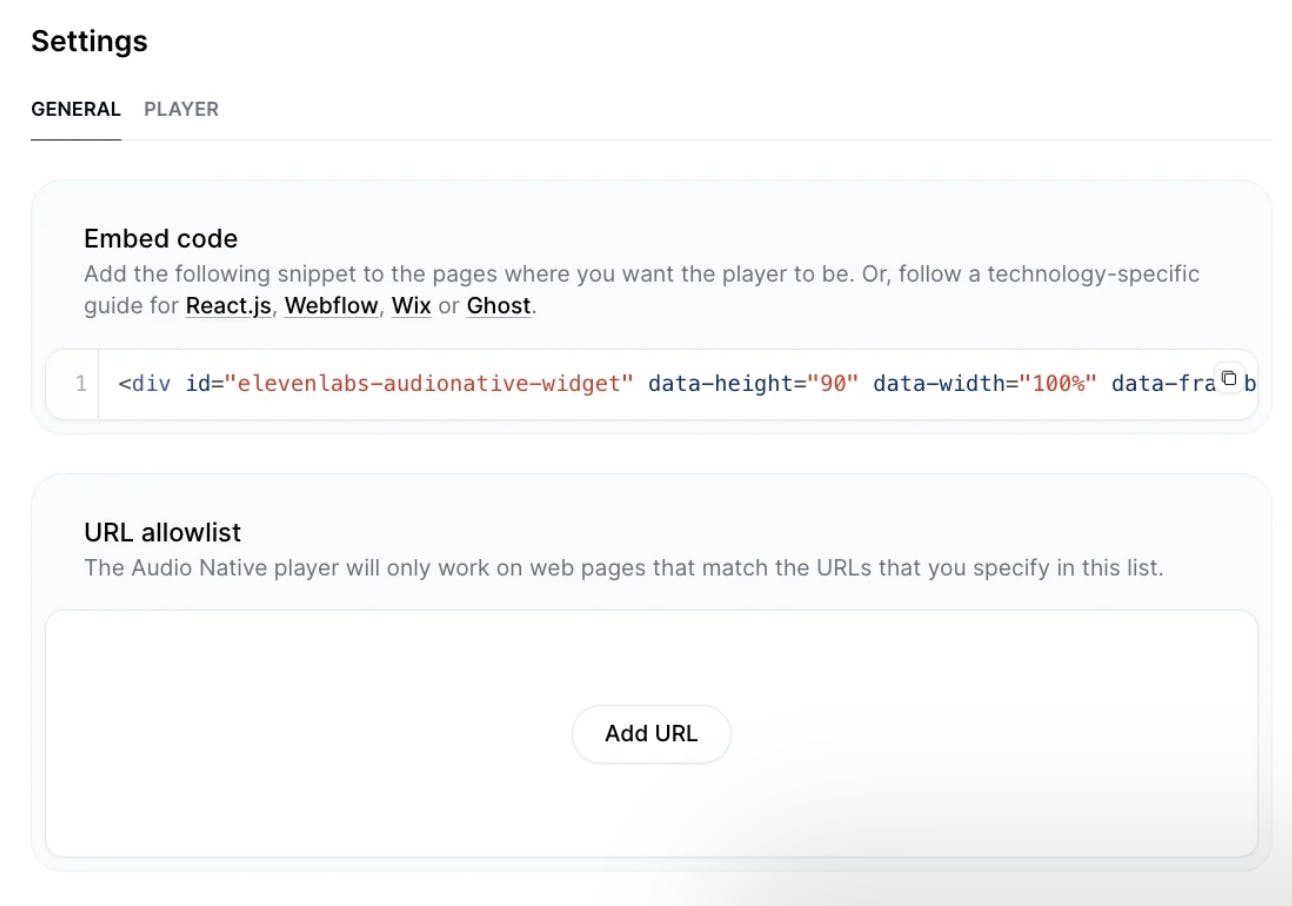
Source: ElevenLabs
Audio Native addresses various needs, such as improving accessibility for visually impaired users and auditory learners, enhancing user experience through engaging audio formats, and enabling monetization opportunities with premium audio content. Businesses can also maintain brand consistency through custom voice development. The product has found diverse use cases, including narrated news articles for multitasking audiences, audio options for e-learning platforms, accessible product descriptions in e-commerce, and narrated blogs or podcasts for content creators. For instance, TIME magazine integrated Audio Native to convert articles into human-like AI narration, incorporating custom voices, an intuitive embeddable player, and multilingual narration to cater to a global audience.
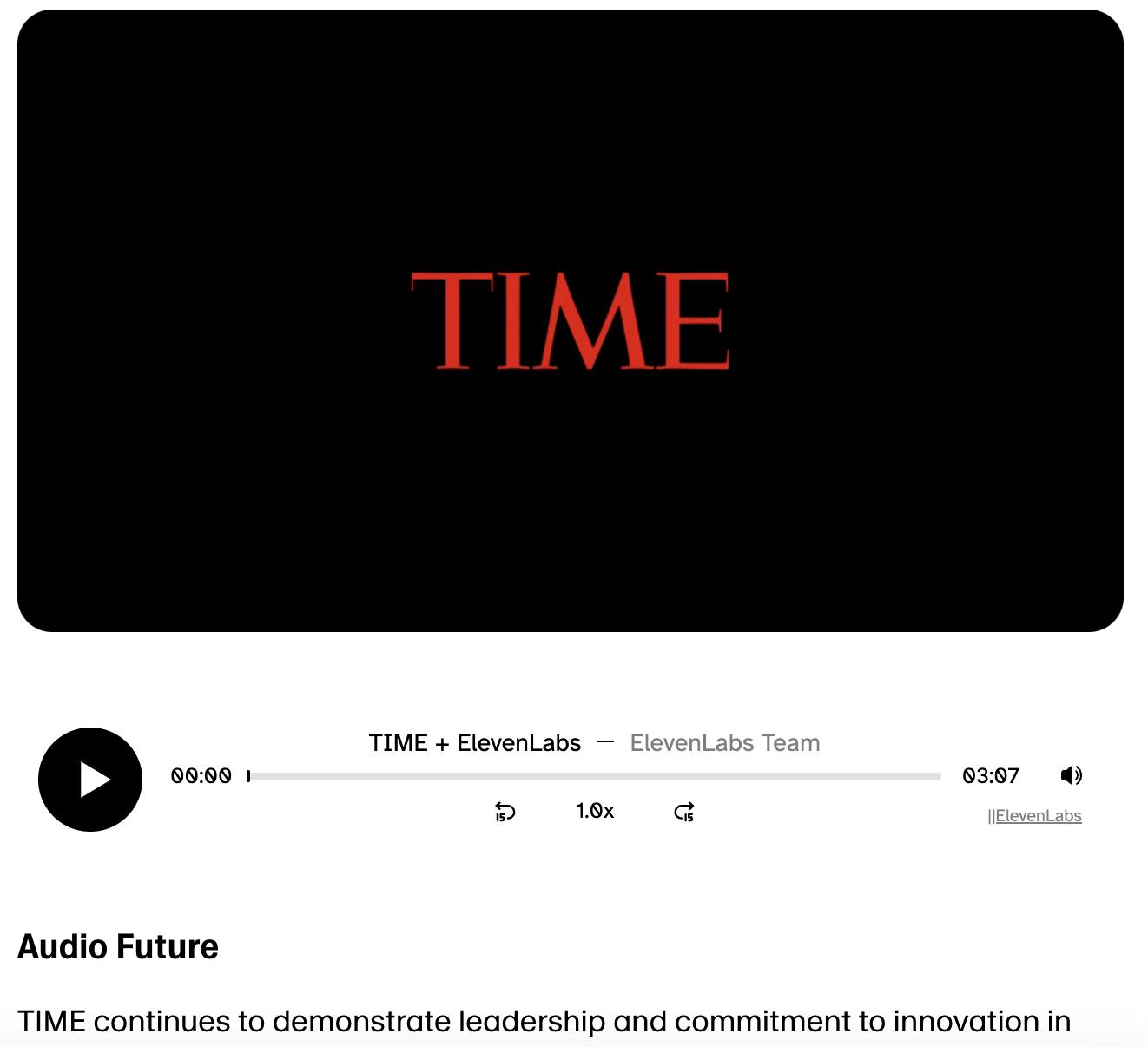
Source: ElevenLabs
ElevenStudios

Source: ElevenLabs
ElevenStudios is a comprehensive platform designed for creators to produce and manage high-quality audio projects using advanced AI tools. Acknowledging that 75% of the world’s population does not speak English, ElevenStudios prioritizes localization and accessibility by offering tools for creating tailored, engaging audio content in multiple languages. Key product lines include text-to-speech, speech-to-speech, voice cloning, dubbing, and long-form audio projects.
TTS capabilities allow creators to generate AI-powered speech from text, with customizable voices to suit different needs. Speech-to-speech tools transform a speaker’s voice while maintaining its characteristics, enabling higher-quality conversions. The voice cloning feature lets users create personalized voice profiles based on sample audio, while the dubbing studio facilitates translation and dubbing in 29 languages, retaining emotional and tonal integrity. For long-form audio projects, tools are tailored for audiobook production or extended narration workflows, with features such as trimming, track adjustments, and looping to refine audio content.
ElevenStudios caters to diverse creators, whether producing audiobooks, localizing content, or developing bespoke voice profiles. It empowers individuals and teams to create professional-quality audio with efficiency and flexibility, making it a valuable asset for content production.
API
The ElevenLabs API is a versatile suite of tools designed to integrate advanced audio generation and voice cloning functionalities into various applications. It supports a wide range of features, including text-to-speech, speech-to-speech, sound effects, dubbing, and conversational AI, making it highly adaptable for developers and businesses.
The text-to-speech (speech synthesis) capability is offered through two model families: standard models and Turbo models. Standard models, such as Multilingual v2, prioritize quality and accuracy for applications like content creation, voiceovers, and post-production. Multilingual v2 supports 29 languages and delivers highly stable, lifelike speech, making it ideal for demanding use cases. Turbo models, including Turbo v2.5, are optimized for low-latency applications like real-time conversational AI, supporting 32 languages and processing speech 300% faster than standard models. These models are suited for developers needing rapid, natural speech generation, albeit with slightly less stylistic range.
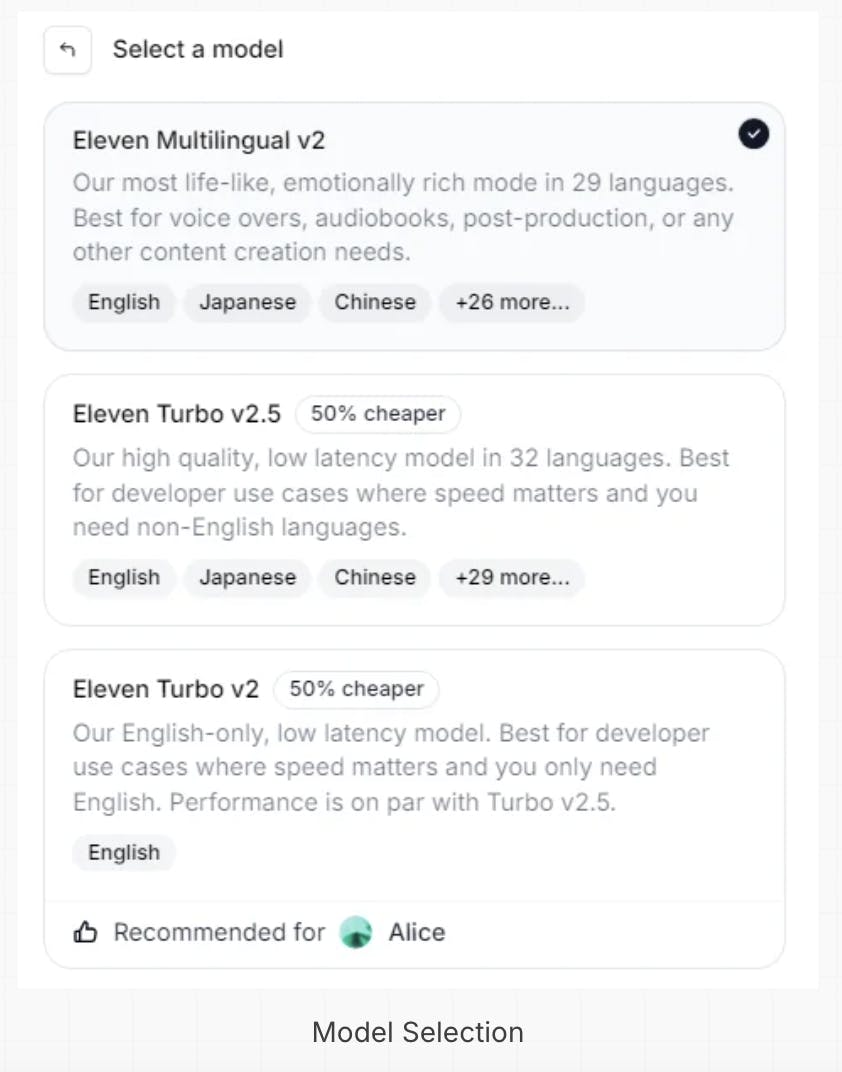
Source: ElevenLabs
The speech-to-speech functionality focuses on replicating tone, style, and expressiveness. It allows users to input natural speech recordings and generate output that mimics the original speaker’s voice while supporting multiple languages and real-time processing. Custom voice creation, real-time and offline functionalities, and integration options further enhance its adaptability for content creation, entertainment, and accessibility tools.
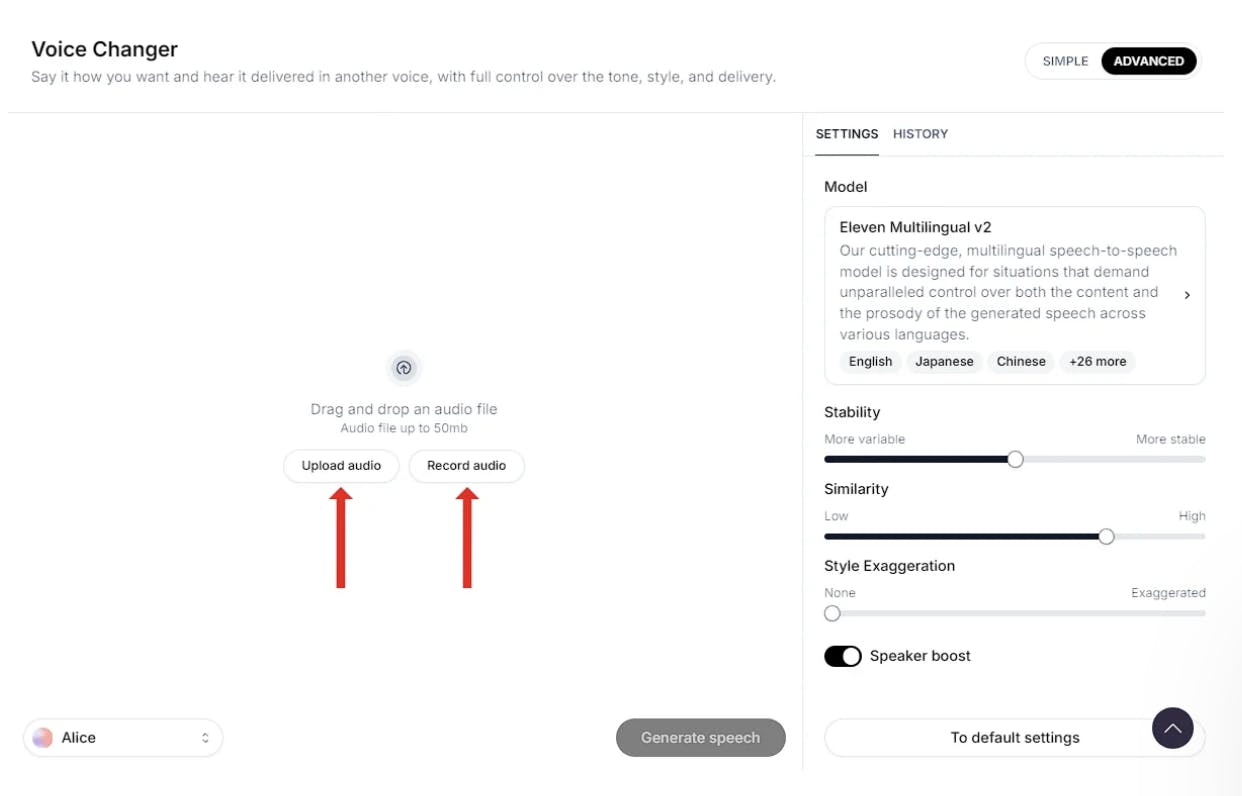
Source: ElevenLabs
Additionally, the API includes a sound effects tool, which leverages natural language prompts to generate audio tailored for films, video games, and other media. This tool simplifies sound design, offering multiple variations for each prompt and customizable settings. Collaborations with platforms like Shutterstock have made the tool widely accessible, providing creators with an efficient alternative to manual recording or sourcing sounds.
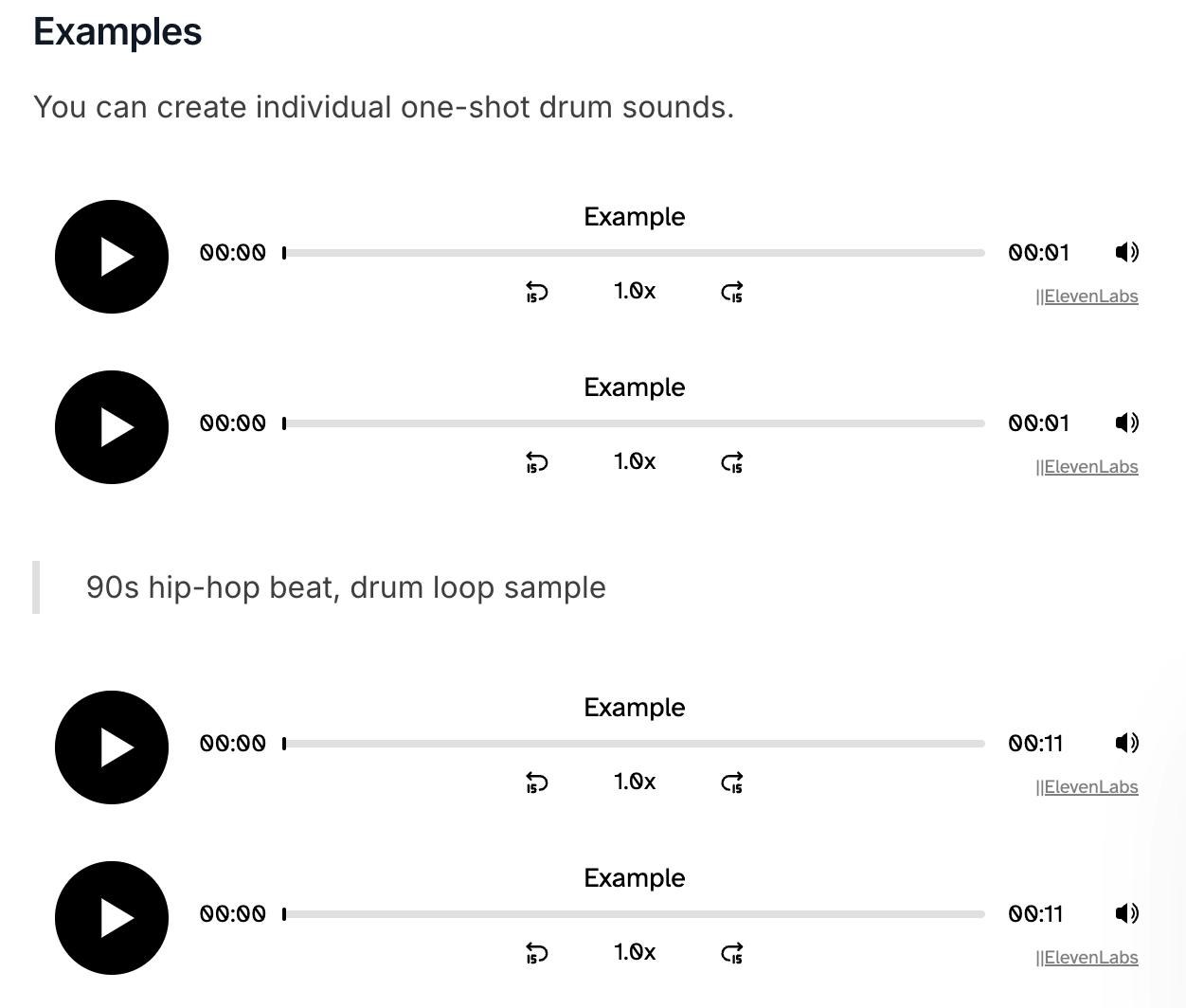
Source: ElevenLabs
Voiceover Studio
ElevenLabs’ Voiceover Studio offers a comprehensive platform for creating lifelike voiceovers and dynamic audio projects. The studio combines an audio timeline with a Sound Effects (SFX) feature, allowing users to write dialogues with multiple speakers, select specific AI-generated voices, and integrate sound effects. Users can choose from three types of tracks: voiceover tracks, SFX tracks, and uploaded audio, giving them flexibility in crafting personalized audio content. The platform’s ability to generate natural-sounding speech with nuanced emotional expressions ensures an authentic and engaging listening experience.
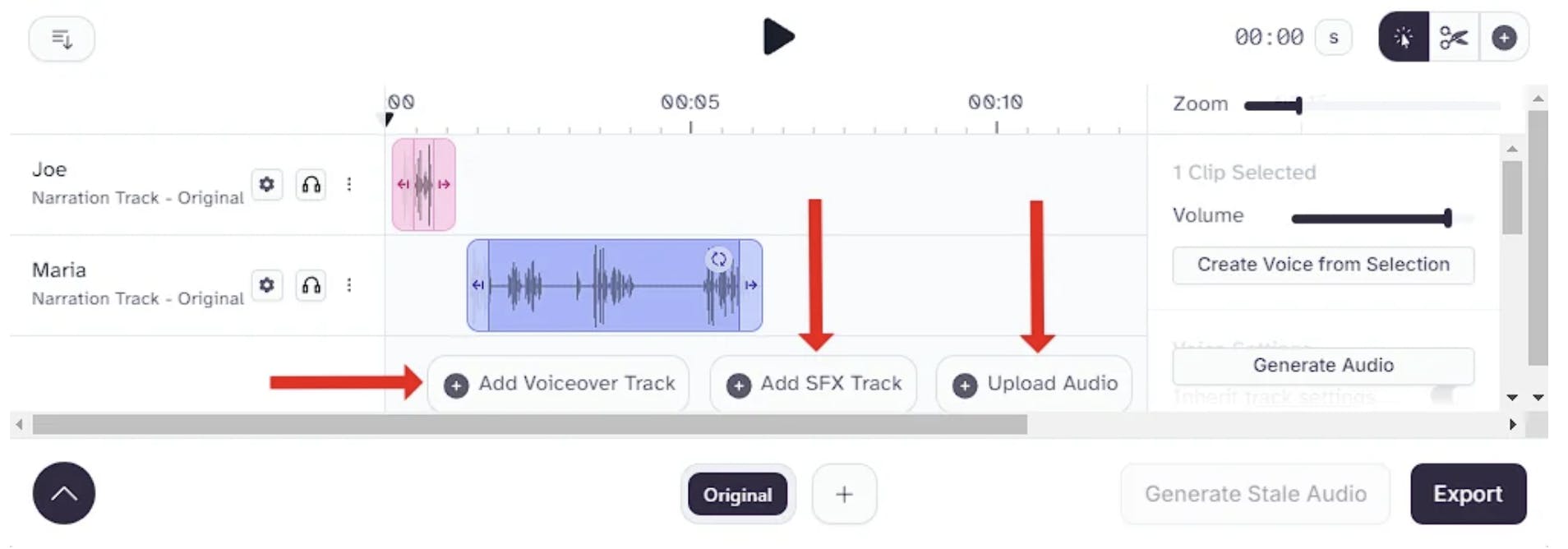
Source: ElevenLabs
One key feature of Voiceover Studio is custom voice creation. Users can upload audio samples to develop unique voice profiles tailored for branding, storytelling, or replicating specific vocal styles. Unlike the Dubbing Studio, which is optimized for syncing audio with video, Voiceover Studio offers users full control over the timeline without time constraints, providing greater freedom to design intricate audio projects. This versatility makes it ideal for creators seeking advanced tools for audio production without being tied to video requirements.
ElevenReader
ElevenReader brings advanced TTS capabilities to mobile platforms, transforming how users interact with written content. Enhanced in November 2024 with the integration of the GenFM feature, the app enables users to convert uploaded content into personalized, AI-generated podcasts. Users can upload a variety of file types, including PDFs, eBooks, articles, and YouTube video transcripts. The app supports ultra-realistic AI voices with conversational elements such as pauses, laughter, and breathing, creating an experience that closely mimics natural human dialogue.
The GenFM feature takes the ElevenReader experience further by offering interactive AI-generated podcasts. The platform uses two AI co-hosts to deliver dynamic, conversational interpretations of uploaded content. Supporting 32 languages, including English, Hindi, Spanish, and Portuguese, GenFM ensures accessibility for a global audience. Users can explore diverse applications, such as summarizing news, discussing academic materials, or delivering audio storytelling for leisure activities like commuting or workouts.
Currently available on iOS with an Android waitlist, ElevenReader also allows users to combine multiple sources into a single podcast, enriching narratives with diverse perspectives. To use the feature, users paste text, upload documents, or input a YouTube URL. The platform automatically generates a conversational podcast featuring AI voices, offering a unique way to consume information on the go.
Market
Customer
ElevenLabs serves a diverse customer base across multiple industries, each with unique needs for advanced AI-driven voice solutions. The ICP includes media and entertainment companies, such as film studios, gaming firms, and broadcasters, seeking cost-effective, scalable voice synthesis for dubbing, character voices, and immersive storytelling. Similarly, the publishing industry—encompassing authors, audiobook producers, and educational content creators—can rely on ElevenLabs for multilingual narration tools that facilitate global reach. Technology enterprises and creators, including YouTubers, podcasters, and social media influencers, benefit from the company’s professional-grade tools to enhance customer support, virtual assistants, or digital content. Additionally, global marketing teams leverage ElevenLabs’ multilingual voice capabilities for personalized advertising and localization of campaigns.
Selling ElevenLabs’ offerings revolves around several pain points the product addresses, such as the high costs and inefficiencies of traditional voiceover production and localization. While enterprise-level clients like broadcasters and publishers may require proof of concept and detailed agreements, the demonstrated cost savings and scalability generally appeal to a broad audience of potential users. The platform is also accessible to small creators, democratizing high-quality audio production for those who previously lacked affordable tools.
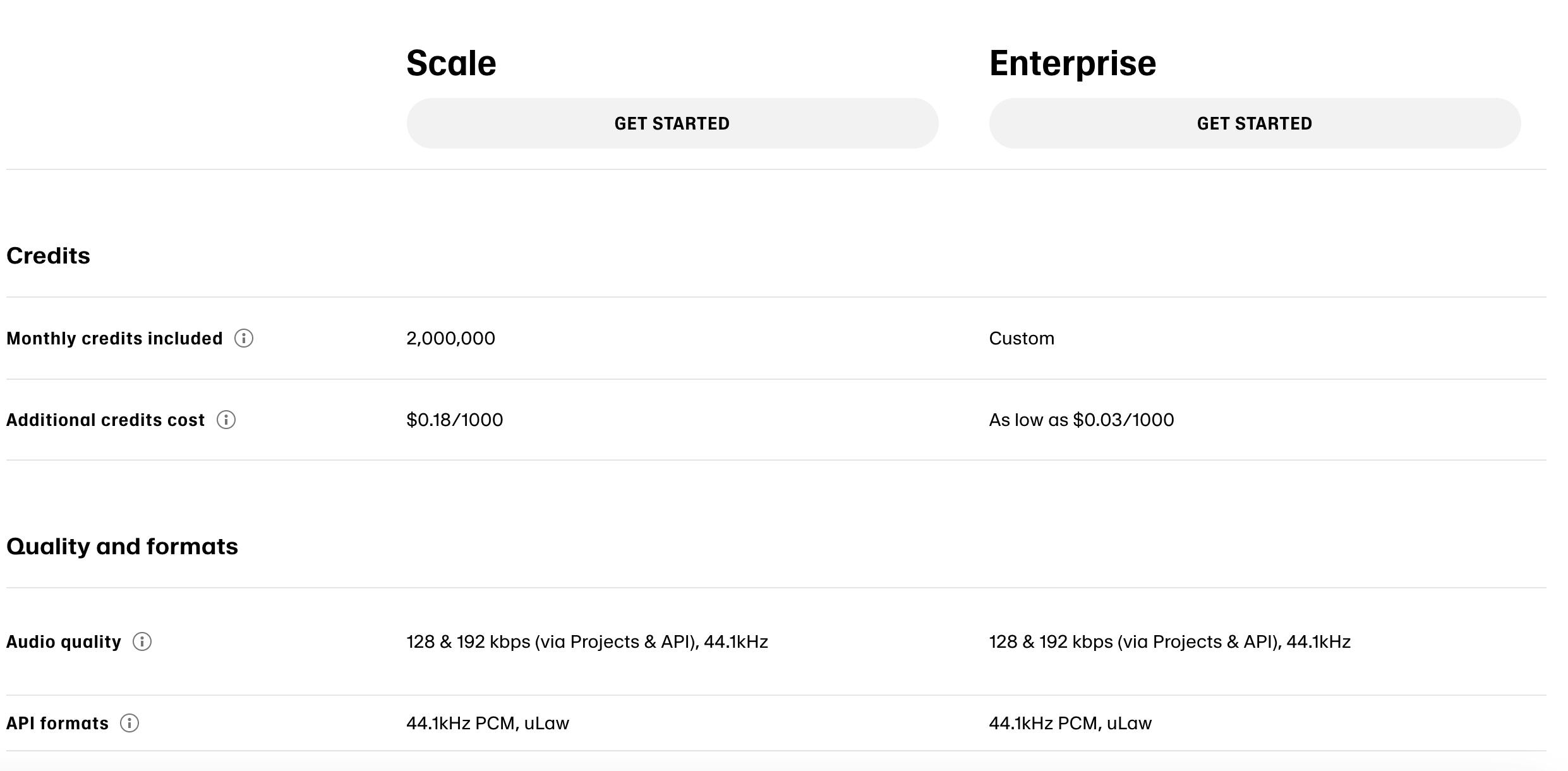
Source: ElevenLabs
ElevenLabs has a fairly diverse customer base that spans industries like media, gaming, publishing, and enterprise solutions. Customers include Paradox Interactive, which has cut audio generation times from weeks to hours; Chess.com, which enhances interactive tutorials with AI narration; and publishing partners like Leeanna Morgan, which has expanded audiobook sales using ElevenLabs’ tools. The company also collaborates with startups like Aug X Labs and Magicave, providing innovative storytelling tools and gaming narration solutions. It has been reported that 41% of Fortune 500 companies are already leveraging ElevenLabs’ solutions as of January 2024.
Market Size
ElevenLabs operates within the rapidly growing AI voice cloning market, a subset of the conversational AI and voice recognition industries. This market focuses on generating synthetic voices that replicate human speech patterns with high fidelity, supporting applications such as entertainment, customer service, accessibility, and content creation. The core technologies underpinning this market include AI-driven natural language processing (NLP), automatic speech recognition (ASR), and text-to-speech synthesis. End users range from media companies and e-learning platforms to healthcare providers and individual creators, with deployment models split between cloud-based and on-premises systems.
In 2022, the global AI voice cloning market was valued at $1.45 billion and is projected to grow at a CAGR of 26.1% from 2023 to 2030. ElevenLabs is positioned to capitalize on this growth due to its voice cloning capabilities and multilingual support. The company’s core text-to-speech technology aligns with the booming audiobook market, valued at $5 billion and expected to reach $35 billion by 2030. Across the 41% of Fortune 500 companies using ElevenLabs, there are significant opportunities to expand into enterprise communications as well, including AI-driven call centers, training, and presentations.
Beyond entertainment and enterprise applications, ElevenLabs has demonstrated early success in healthcare, particularly in assistive technologies. By enabling patients who have lost their voices to communicate with emotionally expressive synthesized voices, the company has tapped into a $25 billion assistive technology market. This includes solutions for ALS patients, stroke recovery, and aging populations.
Competition
Competitive Landscape
The TTS and voice AI market has undergone significant growth. This expansion has been driven by the market's evolution from early 1.0 voice systems—such as simple phone trees—to next-generation 2.0 systems powered by large language models (LLMs). These advanced systems enable greater scalability, conversational quality, and emotional nuance, marking a pivotal transition in the industry. The competitive landscape is a dynamic mix of established technology giants and emerging startups, each carving out unique positions across different functionalities.
Within the voice AI ecosystem, companies can be categorized by their specialization. Full-stack providers like Hume and Retell AI offer end-to-end solutions, including automatic speech recognition (ASR) and TTS. In contrast, specialists like ElevenLabs, Azure, and OpenAI focus on delivering high-quality voice synthesis with multilingual capabilities. Speech-to-text providers, such as Deepgram, Whisper (by OpenAI), and AssemblyAI, prioritize transcription accuracy—a crucial component for voice AI systems. Companies like Hume further differentiate themselves by adding layers of emotional inflection and tone management, enhancing conversational realism, while streaming solutions like LiveKit and Daily optimize real-time voice communication pipelines.
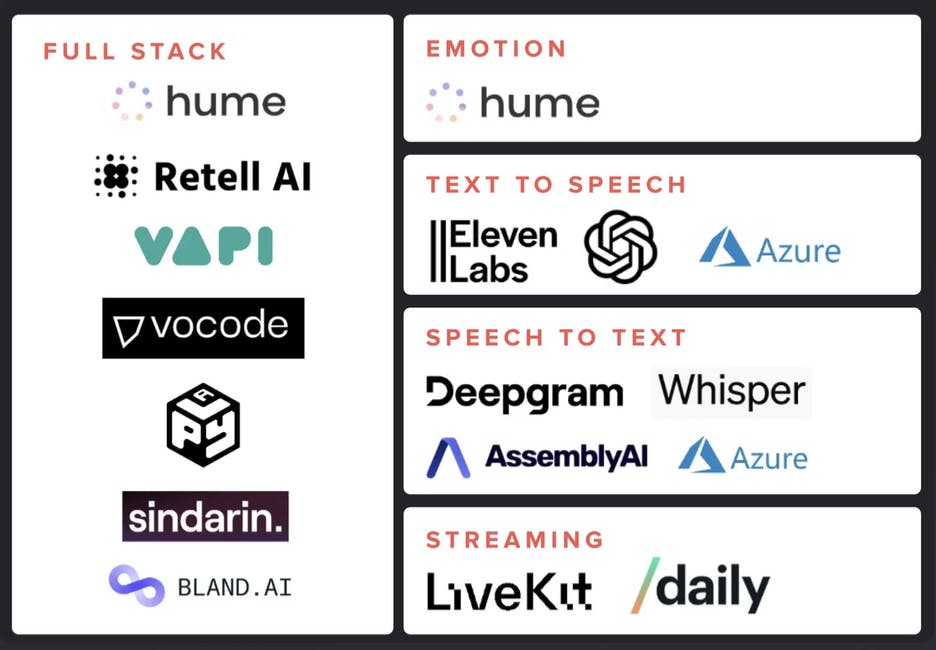
Source: Gamma
Emerging startups are also taking a vertical-specific approach, developing voice agents tailored to industries like healthcare, automotive services, and customer support. This strategy enables the creation of specialized models with unique integrations, such as HIPAA-compliant healthcare solutions, addressing needs that larger, more generalized players might overlook.
ElevenLabs has established several key points of differentiation. Its advanced voice cloning technology creates highly realistic voice replicas across languages and accents with minimal training data, as well as providing more emotional tones and conversational flows, all of which are key in competing in the shift to 2.0 voice systems. ElevenLabs’ commitment to ethical AI development includes implementing robust consent and verification mechanisms for voice cloning and developing guidelines to prevent misuse.
in June 2024, ElevenLabs supported the Future of Artificial Intelligence Innovation Act and the Protect Elections from Deceptive AI Act for a more thorough process on the use of AI in political elections and daily life. Moreover, the company’s API and integration tools provide developers with low-latency solutions that integrate into verticalized stacks, from customer service platforms to SaaS applications.
ElevenLabs’ budding competitive moats include its continuous machine learning improvements and its growing community and creator ecosystem. By regularly updating models to enhance voice quality and diversity while reducing computational demands, the company hopes to stay ahead of the curve. Additionally, its platform for voice creators and developers fosters user-generated voice models, creating network effects that reinforce its market position. Looking ahead, emerging trends such as multi-modal models—which simultaneously handle ASR, TTS, and conversational flow—could further transform the industry. These advancements promise reduced latency, lower costs, and improved naturalness, aligning with ElevenLabs’ capabilities to address industries facing labor shortages, such as customer service.
Despite its strengths, ElevenLabs faces challenges, including the complexity of delivering human-quality interactions that meet industry-specific requirements. Navigating regulatory barriers in heavily regulated sectors like healthcare and sales is also critical for scaling into enterprise-grade solutions.
Competitors
Tavus: Tavus is a notable competitor that combines generative AI for voice and face cloning to create personalized video content. Founded in 2020, Tavus raised $18 million in Series A funding in August 2023. As of February 2025, the company had a total funding amount of $24.2 million and a valuation of $80 million. Unlike ElevenLabs, which specializes in high-quality voice synthesis, Tavus integrates voice and face cloning for scalable video production, catering to a unique niche within the generative AI market.
Resemble AI: Resemble AI founded in 2018, focuses on hyper-realistic AI voices for applications in gaming, customer service, and content production. The company raised $8 million in a Series A funding round in July 2023 with lead investor Javelin Venture Partners. The company differentiates itself by embedding inaudible watermarks to identify AI-generated voices, ensuring ethical use. With $12 million in total funding as of February 2025 with investors like Mercuri, Resemble AI shares similarities with ElevenLabs in delivering high-fidelity voice cloning but stands apart through its emphasis on security and traceability.
Murf AI: Founded in 2020, Murf AI targets content creators in advertising, e-learning, and video production with its natural-sounding AI-generated voiceovers. The platform raised $10 million in a Series A round in 2022, bringing its total funding to $11.5 million and achieving a valuation of ~$50 million. While Murf AI shares ElevenLabs’ focus on realistic voice generation, it prioritizes serving the creator economy with pre-designed voice options and editing tools, making it more accessible to smaller-scale users.
Lovo AI: Founded in 2019, Lovo AI delivers multilingual AI-driven voiceovers tailored to e-learning, advertising, and gaming. The company raised $6.7 million in a Seed Round in May 2022. With $6.7 million in total funding and a valuation of $23 million as of February 2025, Lovo emphasizes localized and natural-sounding voices for global markets. Like ElevenLabs, Lovo excels in realistic TTS capabilities but differentiates itself through its focus on regional and multilingual localization.
Respeecher: Founded in 2018, Respeecher specializes in voice replication for media, gaming, and film production. As of February 2025, the company had raised $2.5 million in total funding, with a valuation of $8 million. Respeecher’s technology has been used to recreate iconic voices, such as Darth Vader in Star Wars. While Respeecher’s primary focus is on high-quality audio for media and entertainment, ElevenLabs addresses a broader range of applications, from customer service to real-time voice solutions.
Business Model
ElevenLabs generates revenue primarily through a subscription-based SaaS model centered on AI voice synthesis and cloning technology. Its tiered pricing structure is based on text-to-speech character processing volume, providing flexibility for a wide range of users. Additionally, the company has established a voice marketplace, enabling creators to monetize voice profiles and adding an ancillary revenue stream.
The company's pricing includes a freemium model, offering a free tier with 10K characters per month. Paid plans start at $22 per month for creators, with enterprise-level custom solutions available for larger clients.
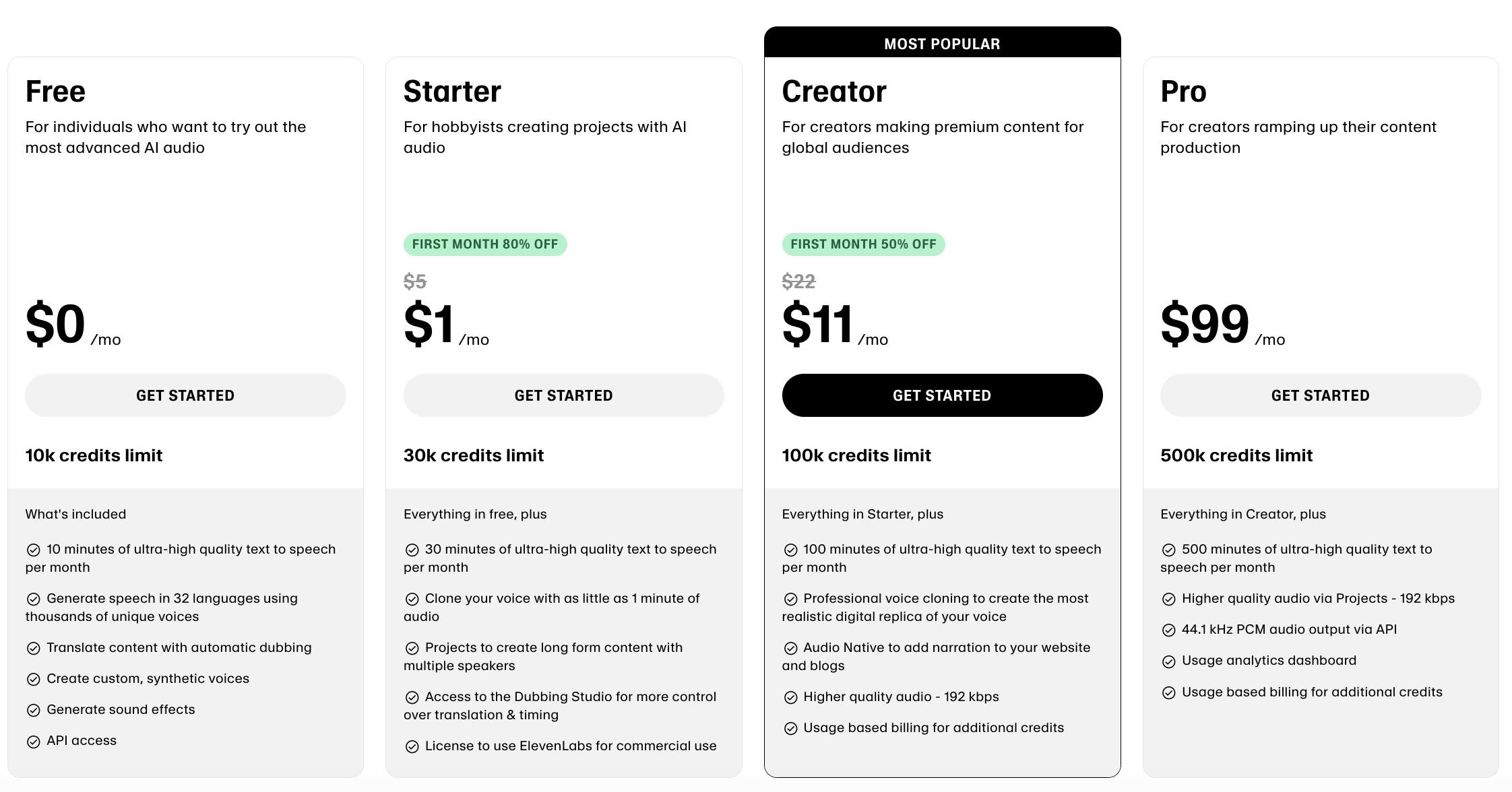
Source: ElevenLabs
Premium plans include advanced features such as professional voice cloning and higher-quality audio output, catering to professional and enterprise users seeking more robust capabilities.
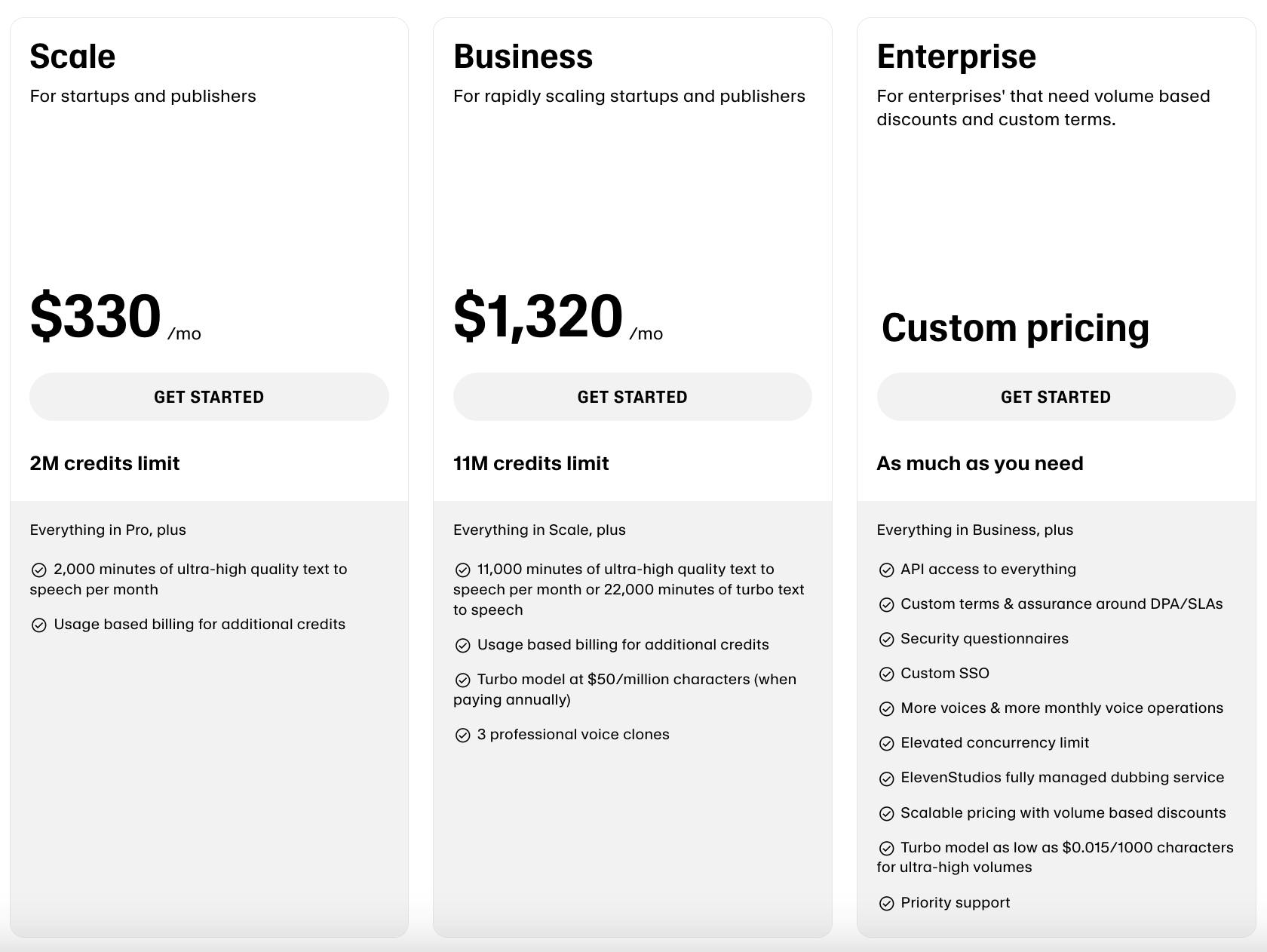
Source: ElevenLabs
ElevenLabs incurs significant costs related to research and development, maintaining a team of seven researchers dedicated to advancing audio AI technology. Additional costs stem from the development and maintenance of proprietary AI voice systems, as well as the computational infrastructure required for AI model training and generation.
The business operates with an asset-light model, relying primarily on intellectual property and software technology rather than physical infrastructure. However, long-term structural costs include continued R&D investment, ongoing computational expenses, and the retention of specialized talent to sustain technological leadership.
Traction
As of October 2023, the ElevenLabs platform had amassed over 1 million registered users, encompassing creators, businesses, and enterprises. In addition to users, ElevenLabs has seen meaningful growth in ARR, from $25 million in 2023 to $90 million as of November 2024.
The company’s features underscore its appeal across different markets. In July 2024, ElevenLabs launched Iconic Voices, a collection of AI-generated representations of historically and culturally significant figures. This feature targets educational and creative industries, offering interactive and engaging ways to learn and create. Additionally, the GenFM feature within ElevenReader transforms documents such as PDFs, ebooks, and articles into dynamic audio content. This caters to the growing demand for audio-based consumption and demonstrates ElevenLabs’ commitment to expanding its product offerings for diverse use cases. Positioning itself as the "Adobe Creative Cloud" for AI audio, ElevenLabs competes across long-form audio editing, video dubbing, and AI voice marketplaces.
The company’s revenue model is anchored in a freemium structure, offering free access to basic features and premium plans starting at $22 per month for creators. Enterprise clients benefit from customized pricing based on usage volume. ElevenLabs has further enhanced its enterprise revenue by increasing revenue per API call by 20% and rolling out new features like Iconic Voices and GenFM. These efforts have bolstered consumption and secured new enterprise deals, contributing to revenue growth and market penetration.
ElevenLabs serves a diverse customer base, including 41% of Fortune 500 companies across industries such as media, gaming, and publishing. Strategic partnerships amplify its market reach and product capabilities. Collaborations with Kapwing enable lifelike voiceovers for video editing, while a partnership with Bertelsmann supports cross-language AI-driven media storytelling, advancing ElevenLabs’ penetration into enterprise-level content creation. Notably, ElevenLabs acquired Omnivore, a company specializing in automated voice pipelines for media distribution, in October 2024. This acquisition strengthens its position in media localization, enabling scalable multilingual dubbing and AI voice solutions tailored to media companies’ needs.
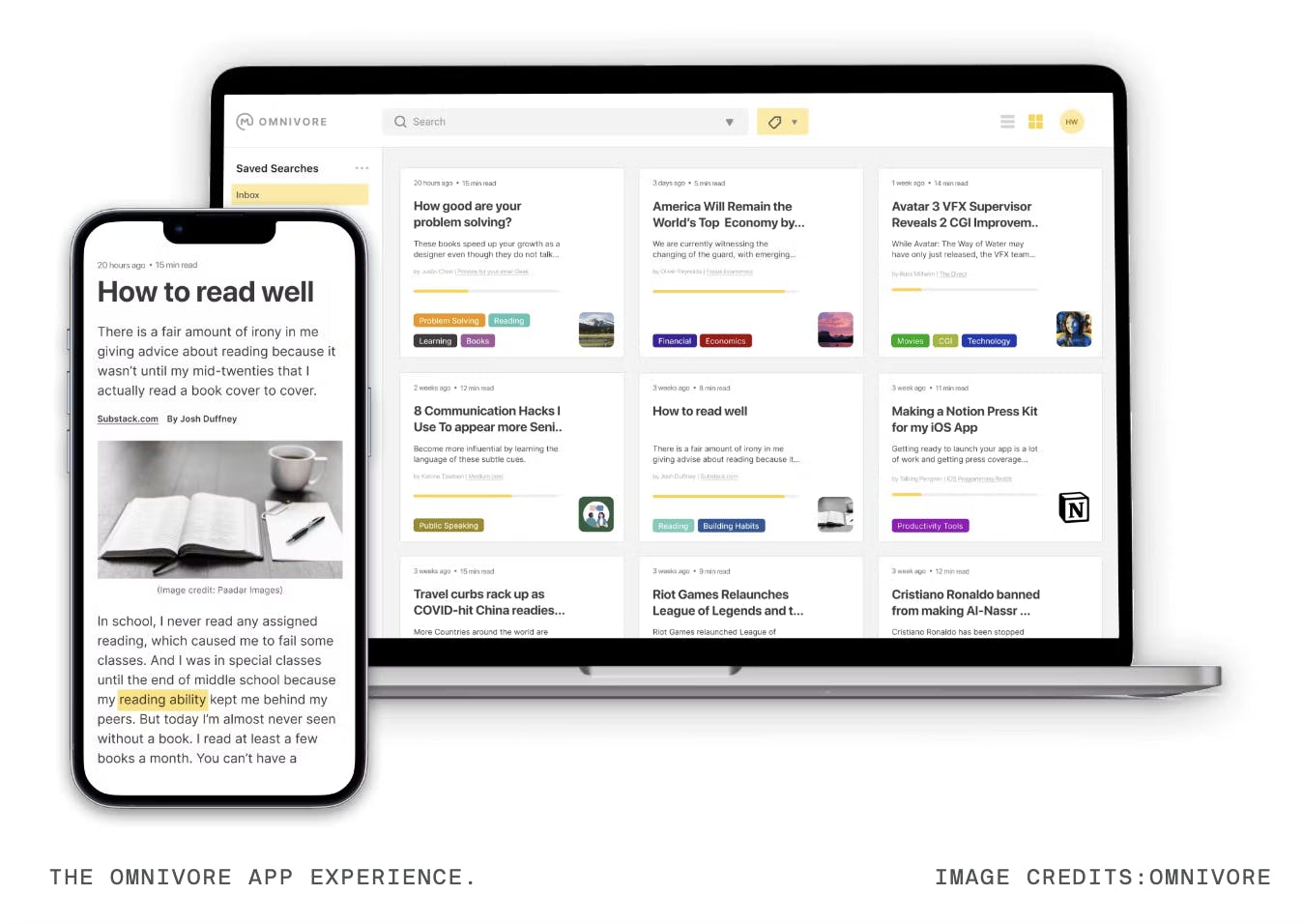
Source: TechCrunch
Valuation
In January 2024, ElevenLabs reached a valuation of $1.1 billion following an $80 million Series B funding round. This round was co-led by Andreessen Horowitz, Nat Friedman, and Daniel Gross. Then, in January 2025, ElevenLabs raised a $250 million Series C at a ~$3.2 billion valuation led by ICONIQ. As of November 2024, some unverified estimates of ElevenLabs revenue were at $90 million, meaning that the company’s Series C represented a ~35.5x LTM ARR multiple.
Other investors in ElevenLabs include Sequoia Capital and Smash Capital, as well as individual investors Nat Friedman and Daniel Gross. As of February 2025, ElevenLabs had raised over $351 million in funding.
ElevenLab’s acquisition of Omnivore positions the company to compete more aggressively in the TTS space against established players like SoundHound, Sprout Social, and Duolingo, who have all demonstrated product capabilities in the space. As of February 2025 these companies traded at an LTM revenue multiple between 4.7-40x. SoundHound, in particular, has been a volatile stock since November 2024, first rising due to rising demand for voice-based software and higher-than-expected revenue growth. During 2025, SoundHound’s stock price has seen a steep decline due to criticisms of its new in-vehicle AI system at CES and increased operational costs.
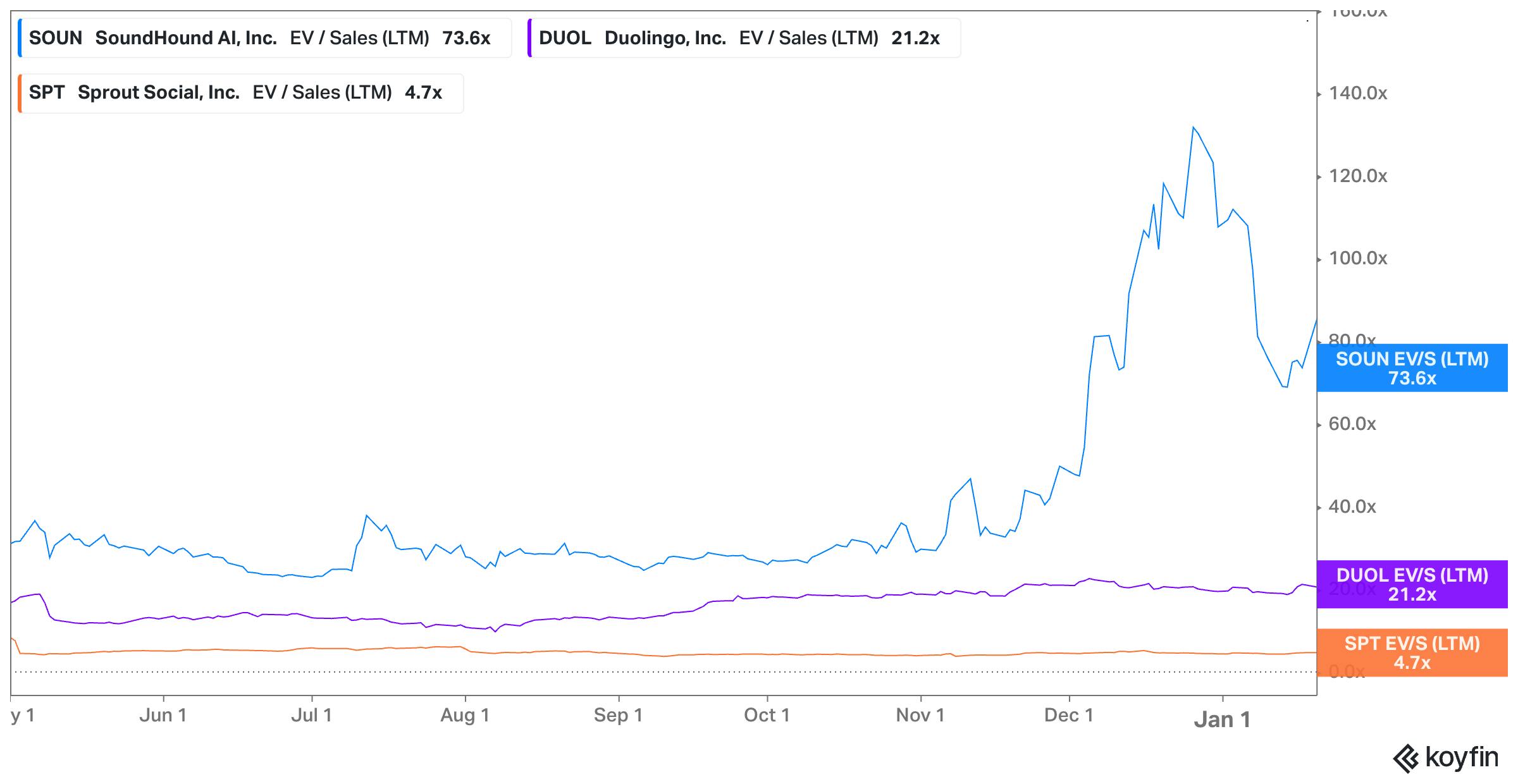
Source: Koyfin
Key Opportunities
Expansion in Media Localization & Content Dubbing
The global media localization market, driven by increased demand from streaming platforms, gaming, and international media consumption, is projected to reach $3.5 billion by 2028. ElevenLabs’ product caters directly to this market with features like multilingual dubbing and TTS technologies. The acquisition of Omnivore has enhanced its automated dubbing capabilities, enabling scalable solutions for media companies aiming to localize and distribute content globally. High-profile clients such as TIME and HarperCollins already utilize ElevenLabs’ AI solutions to broaden their audiences across diverse regions.
The company’s proprietary voice cloning and dubbing technology, known for producing high-quality, emotion-rich multilingual audio, serves as its competitive edge. Coupled with the increasing global appetite for non-English content and the proliferation of streaming platforms, ElevenLabs could see a meaningful lift from the localization market.
Shift Toward Long-Form Audio Consumption
The global audiobook market is projected to grow to $19.7 billion by 2028, reflecting the rising popularity of long-form audio content such as podcasts and audiobooks. This trend presents an opportunity for ElevenLabs to expand beyond its core TTS and dubbing tools by integrating deeper into content creation and consumption platforms. By streamlining audio production, the company offers publishers, creators, and media companies cost and time efficiencies. As consumer lifestyles shift toward audio-first formats due to increased commute times and multitasking, demand for high-quality, accessible audio content is expected to rise. ElevenLabs is well-equipped to address this demand.
Enterprise Adoption
Generative AI is experiencing widespread adoption across industries, with the enterprise AI market projected to reach $104 billion by 2030. ElevenLabs has demonstrated its ability to meet diverse enterprise needs, with its platform already integrated into the workflows of 41% of Fortune 500 companies. This established footprint highlights its potential for growth as generative AI solutions become more embedded in enterprise operations.
Key Risks
Regulatory & Ethical Vulnerability
ElevenLabs’ voice cloning technology faces significant regulatory and ethical risks due to its potential misuse. Historical incidents involving deepfakes, such as fake robocalls impersonating political figures, underscore these vulnerabilities. Despite existing safeguards, the company may face governmental regulations, platform bans, or reputation damage if its technology is misused.
Scalability & Quality Compromise
The company’s competitive edge relies heavily on the superior voice quality achieved through intensive research and computation. However, the long-term sustainability of this advantage may be challenged by the need to reduce computing costs. Any compromises on quality could erode ElevenLabs’ differentiation, particularly against resource-rich competitors like OpenAI. Failing to maintain its current quality standards could result in the loss of its market position.
Voice Actor Ecosystem Disruption
The rise of AI-generated voices risks alienating the professional voice acting community. ElevenLabs’ current revenue-sharing model, which uses platform credits, may be viewed as inadequate by voice actors. These tensions echo the complaints in movements such as the 2023 SAG-AFTRA strikes against AI in entertainment, highlighting the potential for conflict. Building sustainable relationships with voice talent will be critical to ensuring long-term success and avoiding industry pushback.
Summary
The TTS and voice AI industry is characterized by robust market growth and diverse use cases, including content creation, customer service, and accessibility. Technological advancements continue to drive the industry forward, with key competitors innovating rapidly. ElevenLabs has made a name for itself with its proprietary technology, offering emotion-rich speech synthesis, multilingual support, and superior dubbing capabilities. Its solutions cater to various industries, including media, publishing, and enterprise operations, where it has achieved notable adoption. The company’s go-to-market strategy involves leveraging partnerships, scalable distribution channels, and licensing models, enabling it to strengthen its foothold in a competitive and evolving market. At the same time, the company will have to face hurdles such as increased competition, performance improvements, and potential regulatory or ethical threats.





